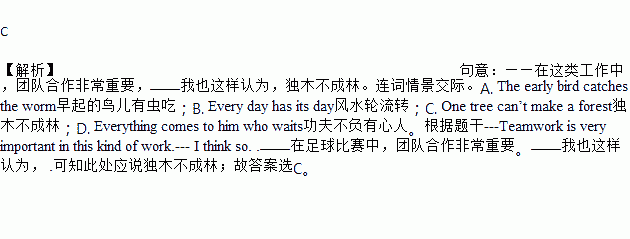题目内容
---Teamwork is very important in this kind of work.
--- I think so. .
A. The early bird catches the worm B. Every day has its day
C. One tree can’t make a forest D. Everything comes to him who waits
C 【解析】句意:——在这类工作中,团队合作非常重要,——我也这样认为,独木不成林。连词情景交际。A. The early bird catches the worm早起的鸟儿有虫吃;B. Every day has its day风水轮流转;C. One tree can’t make a forest独木不成林;D. Everything comes to him who waits功夫...
练习册系列答案
 学练快车道口算心算速算天天练系列答案
学练快车道口算心算速算天天练系列答案
相关题目

